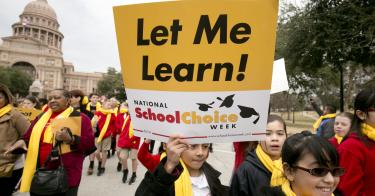Neither rain, nor snow, nor legislator hypocrisy can keep Governor Greg Abbott off the school-choice trail. This week, as in weeks past, the governor has crisscrossed the Lone Star State extolling the virtues of education freedom. And on Wednesday, in a hearing on a prospective universal education-savings-account law, expert witnesses and parents testified in favor of the proposal into the wee hours of the night.
What are the prospects of school choice in Texas? For years, education-choice advocates have lamented the lack of schooling options in the red state. Proponents have been likened to Charlie Brown, optimistically believing that they’ll finally kick the football, only to have Lucy pull it away at the last minute.
But this time does feel different. Governor Abbott has been a full-throated champion for universal education-savings accounts (ESAs), declaring their introduction an emergency item. Lieutenant Governor Dan Patrick has been a long-time advocate. There is palpable excitement in the halls of the state capitol. It’s a top-eight Texas GOP legislative priority. Parents are rallying in support.
Support among Republican primary voters has increased dramatically over the past few years. Eighty-eight percent supported school choice on the 2022 ballot, up nine points since 2019.
A school-choice bill passed the Republican-controlled state senate easily in 2017 before there was any real momentum behind the effort. Significant enthusiasm has built up since then, improving the odds of success this time around. Yet historical reticence among Republican lawmakers from rural districts due in part to the influence of public-school superintendents and teachers’ unions could mean that, in the house, the path forward could need the support of some Democratic lawmakers.
>>> Florida Sets Shining Example on School Choice. Here’s How
This is what makes the school-choice hypocrisy of some state legislators so troubling.
Texas house minority leader Trey Martinez Fischer (D.), who went to private school himself and sent his children to private school, said in a cringe-y video uploaded to Twitter: “If defunding education with vouchers is his [Governor Abbott’s] dream, we’re his nightmare.”
Fischer has said he’ll “be the first one on the floor to use everything [he’s] got to stop” the push for school choice.
Not to be outdone, state representative Armando Walle (D.), who also sends his kids to private schools, said that giving families options is “a fundamental threat to our democracy because it undermines the ability to pay for public schools.”
None of this is true, of course. A long list of rigorous empirical studies confirms that school choice improves academic outcomes, parent satisfaction with their child’s schooling, student safety, tolerance of others, political participation, voluntarism, and a host of other indicators. Most importantly, it enables families to select learning environments that align with their values.
On the other side of the capitol building, all three Democrats on the Texas senate education committee attended or sent their children to private schools, yet none of them stood up for giving other families that opportunity. Senator José Menéndez, a Catholic-high-school graduate, insisted repeatedly in the hearing that other families shouldn’t have the same opportunities as he did.
Then there’s Beto O’Rourke, a staunch school-choice opponent who once called it a “ploy to funnel funds reserved for public education into private schools.” One wonders if he felt the same way when he chose not to enroll in public school (“depriving” that school of his tax dollars) and instead enroll in a tony private boarding school instead.
These same Democrats who claim to be champions of the poor and the working class will say that it was their decision to attend or send their children to private schools, so they paid for it out of pocket. How nice that they were able to do so in addition to funding public schools through their taxes.
>>> Parents Are Fed Up With Public Schools Secretly Transitioning Children
Education freedom changes that equation so that families that seek alternatives to public schooling are funded directly and don’t have to pay twice—for public schools and for the school they choose to attend. Rather than spend money on school systems to which children are assigned based on where they can afford to live, school choice enables parents and students to pick the learning environment that works best for them. It levels the playing field.
As economist Milton Friedman recommended, education-savings accounts separate the financing of education from the delivery of educational services. As he explained, public education does not require government delivery of schooling.
The idea of funding families directly with public dollars, as is already the case with public funding such as Pell Grants for college and food stamps, should not be controversial. Government officials don’t assign Pell Grant–recipient students to colleges; they don’t confine food-stamp recipients to their local grocery stores.
The idea of funding students rather than systems is also wildly popular. More than six in ten Texans support school choice, according to a University of Houston poll published in January—a figure that climbs to 78 percent for black Texans. Sixty percent of respondents in rural Texas support school choice. Notably, a full 57 percent of Democratic respondents, and 78 percent of black Democrats, said they support school choice, too, as did 57 percent of Hispanic Democrats. Clearly, those officials who oppose adopting education-savings accounts are out of step with most of their constituents.
Iowa, Utah, Arkansas, and Florida adopted universal education-choice programs just this year. If lawmakers stay true to their experiences and voters’ wishes, Texas should be next.
This piece originally appeared in The National Review




